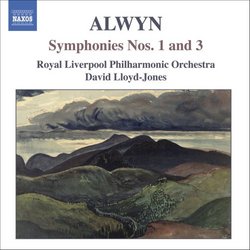| All Artists: William Alwyn, David Lloyd-Jones, Royal Liverpool Philharmonic Orchestra Title: Alwyn: Symphonies Nos. 1 and 3 Members Wishing: 0 Total Copies: 0 Label: Naxos Original Release Date: 1/1/2006 Re-Release Date: 2/21/2006 Genre: Classical Styles: Historical Periods, Modern, 20th, & 21st Century, Symphonies Number of Discs: 1 SwapaCD Credits: 1 UPC: 747313264827 |
Search - William Alwyn, David Lloyd-Jones, Royal Liverpool Philharmonic Orchestra :: Alwyn: Symphonies Nos. 1 and 3
 | William Alwyn, David Lloyd-Jones, Royal Liverpool Philharmonic Orchestra Alwyn: Symphonies Nos. 1 and 3 Genre: Classical
|
Larger Image |
CD DetailsSimilar CDs
|
CD ReviewsBest in British symphonic music Mr. Louis Blois | New York | 02/28/2006 (5 out of 5 stars) "William Alwyn is certainly getting much deserved attention these days. As David Lloyd-Jones turns out a complete cycle of Alwyn symphonies on Naxos, Rumon Gamba has been recording the composer's film music on Chandos (the third installment of which has just been released). Both represent the finest in music making. Alwyn not only contributed substantially to both the film music and classical genres. In my opinion, he has produced some of the best symphonies to come out of Britain in the 20th Century. I have the two previous complete Alwyn cycles, an early one led by the composer himself on Lyrita, and more recently, one led by Richard Hickox on Chandos. Alwyn's abilities as a conductor of his own works are nothing less than remarkable. His performances, dating from the 1970s and still available, dig in to the music with a strength and conviction that I find unequalled. As each disc of the Naxos cycle emerged, I found Lloyd-Jones to be a fiercely committed interpreter of the Alwyn canon. Until now I never much cared for the Alwyn First. It frankly lacks the tightness and overall cohesiveness of his subsequent works in the genre. Not even Alwyn's own performance makes a convincing case for it. Lloyd-Jones' performance, however, made me feel as if I were hearing the work anew. As in previous installments, he makes strong connection with Alwyn's broad, moody romantic lyricism and impetuous surges of passion. He gives marvellous shape to the rather rhapsodic first movement, pulling together its shifting moods and contrasting episodes with fine overall sweep. He takes Alwyn's broad climaxes with a grand, even monumental sense of epiphany. As in the rest of the series, he is totally immersed in the broad surging waves of Alwyn's melodic arches and kinetically restless episodes. Lloyd-Jones gives a superb reading of Alwyn's mighty Third Symphony, one of my top ten favorite symphonies of the 20th Century. The opening movement's pulsing sense of urgency and forward momentum is captured brilliantly. Instrumental details are heard as never before. I would never give up Alwyn's own impassioned, incomparable interpretation. Lloyd-Jones tends to be a bit more aggressive in his approach while Alwyn more brings out the dark, seething urgency beneath the surface with greater emphasis on the all-important atmospheric aspect. For that, Alwyn's rendition of this work remains my first love. Lloyd-Jones, however, breathes new fire into the score, building climaxes and forging ahead with a deeply committed sense of mission. Likewise in the slow movement, the sudden surge ahead in tempo in the central section is nothing less than gripping; the yearning outer sections are beautifully realized. The playing by the Royal Liverpool Philharmonic is top notch, as is the quality of recorded sound. For those seeking to explore the best in British symphonic music, and for those who are already admirers of Alwyn's prolific film music, this installment, nay, this entire series, is highly recommended." A solid release Russ | Richmond, VA | 07/29/2006 (4 out of 5 stars) "The music of the British composer William Alwyn (1905-1985) needs a strong advocate if it is going to become better known. Well, that's what we find here with David Lloyd-Jones leading the Royal Liverpool Philharmonic Orchestra. This performance is fantastic.
But what about the music itself on this release? In response to this question, I would say while the first symphony is good, the third symphony is great. In comparison to the third symphony, the first symphony seems to be just a bit disjointed, whose movements last just slightly too long. Listeners will hear some similarities to other compositions here, maybe even some borrowed ideas. Portions of the second movement of the first symphony, for instance, remind me of Moeran's Symphony in G minor. However, Alwyn's unique musical voice is apparent in the melodic adagio of the first symphony. This is a lovely movement, which just seems to get better and better after each listening. The momentum of the finale of the first symphony brings to mind the first symphony of Walton. This is a very extroverted movement and concludes with an exciting theme in compound meter. The entire fourth symphony is permeated with the influence of Vaughan Williams; especially the Vaughan Williams of the fourth and sixth symphonies. The dark first movement of this symphony has tremendous intensity and always seems to be surging forward. This movement also contains a sinister brass-heavy chorale that those who appreciate the dark side of Vaughan Williams will surely love. For me, the most compelling music on this release is the fantastic conclusion of this symphony. In the finale, the music builds to a climax with blaring Vaughan Williams-like brass chords, over a percussive motif (think "Mars"), which is brought to halt by a Waltonesque trick cadence. Following this, the music turns mysterious, yet lovely, bringing to mind Vaughan Williams' ninth symphony. However, it should be noted that the first performance of Vaughan Williams' ninth symphony took place two years after Alwyn completed his third symphony. Alwyn's symphony probably doesn't reach the heights of Vaughan Williams' symphonies, but it is still quite good. Those familiar with twentieth century British music will surely have a lot of fun identifying all the similarities between Alwyn's music and the music of better known British composers. However, Alwyn has a distinctive voice, and his music should be better known, especially the fantastic third symphony. Highly recommended. 68:50" |

 Track Listings (7) - Disc #1
Track Listings (7) - Disc #1
